Publication: Mainstreaming equality: Progress report 2023-25
Mainstreaming equality: Progress report 2023-25
Welcome to our mainstreaming equality progress report for 2023 to 2025. This report summarises progress delivering our equality outcomes:
- Outcome 1: Our work supports the public sector to address inequalities including protected characteristics and socio-economic disadvantage, and to protect human rights.
- Outcome 2: We will increase the diversity of people into Audit Scotland.
- Outcome 3: We will broaden our culture of diversity and inclusion.

It supports our public sector equality duty to report progress on mainstreaming the equality duty at least every two years. We highlight our achievements since our last progress report in 2023 and identify where we can continue to improve. These will be taken forward through our new diversity, equality and inclusion strategy for 2025 to 2029.
Outcome 1
Our work supports the public sector to address inequalities including protected characteristics and socio-economic disadvantage, and to protect human rights.
- Outcome 1: Our work supports the public sector to address inequalities including protected characteristics and socio-economic disadvantage, and to protect human rights.
- Outcome 2: We will increase the diversity of people into Audit Scotland.
- Outcome 3: We will broaden our culture of diversity and inclusion.
Our reporting
Our commitments:
- Findings and recommendations in our audit work will highlight where progress is being made and where improvement is needed to address inequalities and human rights issues.
- We will publish a range of outputs which reflect and respond to changes in the inequalities and human rights policy environment. This will support public bodies to address inequalities and human rights issues.
Equalities in our annual audit cycle
Since 2023 Best Value thematic work has been integrated within the annual audits of all councils in Scotland. During the 2022/23 audit year, the Accounts Commission selected leadership as the Best Value thematic area of focus. The Commission set out its expectations that inequalities are reflected in the high-level goals of the council. Auditors found that all councils have an agreed plan aimed at tackling poverty and inequalities and recommended that equality impact assessments (EIAs) are completed early and published.
The Accounts Commission’s local government budget briefing 2024/25 noted the importance of councils considering the equality impacts their budget choices will have on different groups and communities. It found that 28 councils carried out EIAs as part of their budget setting process. Where councils did not carry out EIAs, this was because proposals did not change existing policies or because they plan to carry out EIAs on proposed savings passed.
More broadly, auditors are expected to consider equalities in all applicable audited bodies and report on it at least once during the five-year appointment round. We are two years into the current appointment round and most audits are still to report on equalities.
Our East Ayrshire Council 2022/23 Annual Audit Report highlighted the council’s action plan for tackling poverty and inequality as well as good practice on engaging with communities and improving EQIAs, building on the recommendation of the Accounts Commission.
Findings and recommendations
Our findings in performance audits have highlighted examples of inequalities and barriers to public services experienced by people facing mental ill-health, digital exclusion and substance harm.
In our 2023/24 and 2024/25 performance audit and Best Value reports 53% of our outputs with recommendations have included reference to socio-economic inequalities or protected characteristics.
Across all our outputs
59% referred to socio-economic factors
26% referred to human rights
26% referenced protected characteristics
Recommendations focused on strengthening the data, learning and participation from those with lived experience and improvements in equality impact assessments.
Case studies
Adult mental health
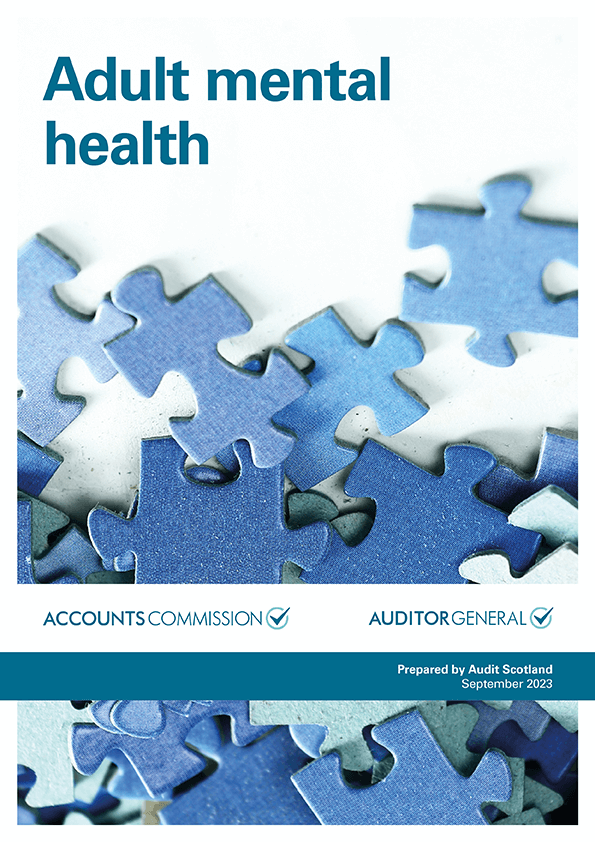
This report covered inequalities in accessing mental health services. Access is disproportionately more difficult for some people. It highlights that inequalities in society and social factors leading to poor mental health must be addressed. Examples of good practice and human rights-based approach to care are included in the report.
Additional support for learning
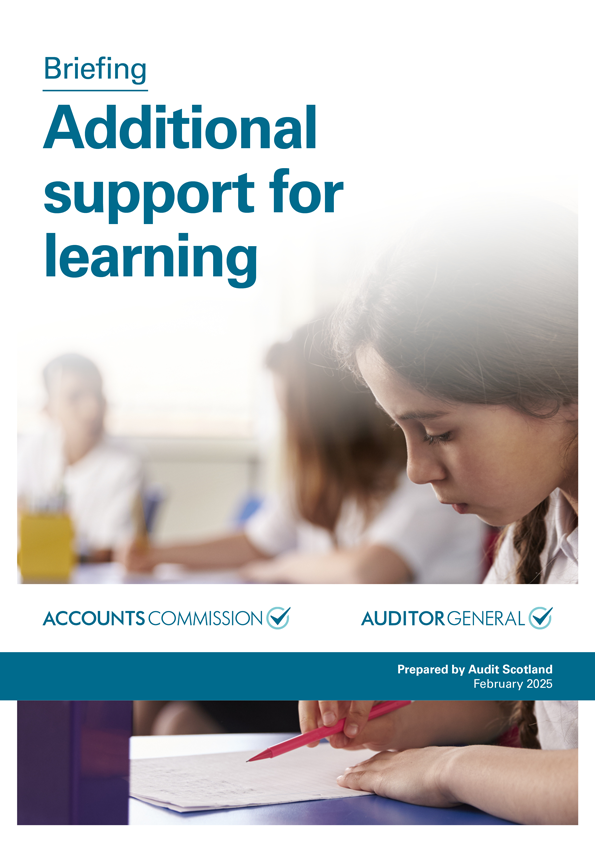
The report acknowledges a strong correlation between deprivation and additional support needs. A lack of available data means the extent of equalities issues is unknown and pupils with a disability under the Equalities Act 2010 are not always recorded in the ASL data.
Fiscal sustainability and reform in Scotland
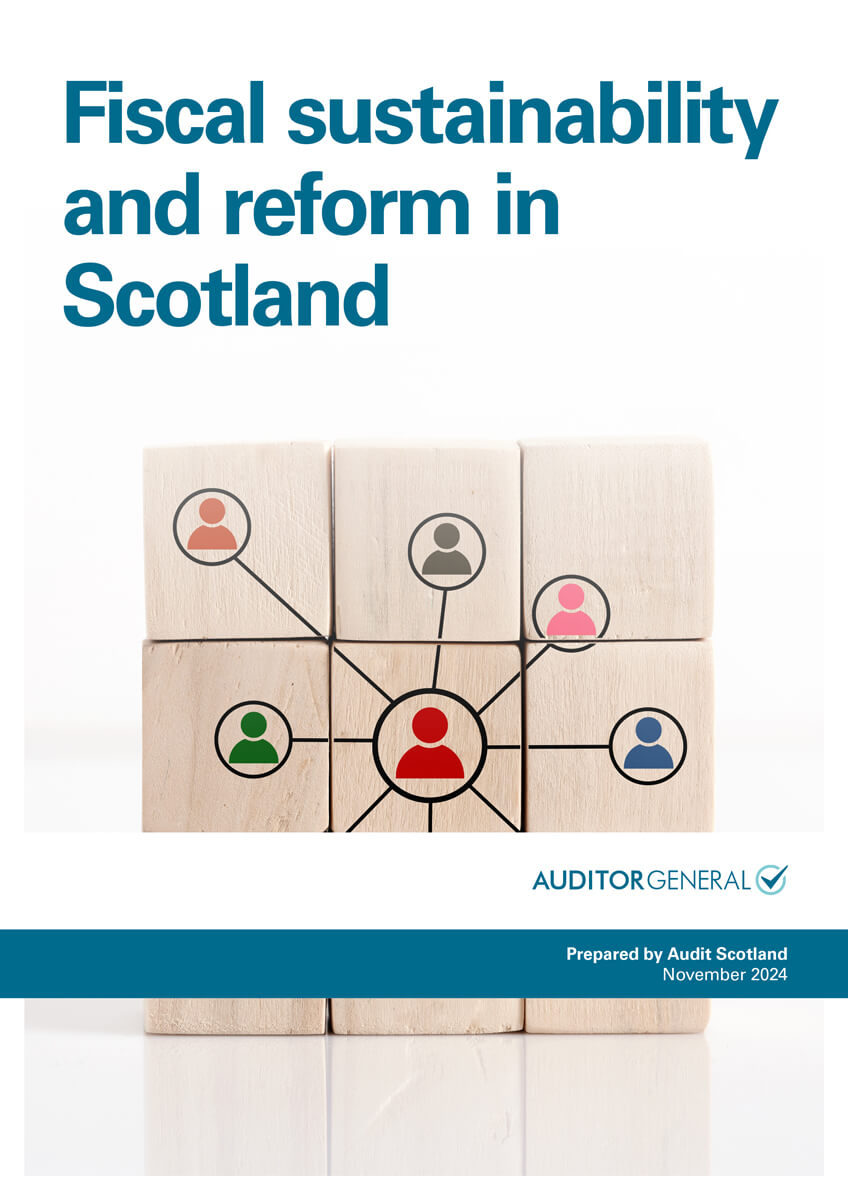
Our Fiscal sustainability and reform in Scotland report recommended the Scottish Government should ‘build equalities and human rights into its decisions about public service reform to understand how financial decisions will affect different groups in society and minimise the negative impacts on people’s lives’.
Communication
Our commitment:
- Our published outputs will meet the different communication needs of the audience.
We have expanded our range of publications, including blogs and briefings, tailoring them to meet the different communications needs of our audiences.
During 2023/24 and 2024/25 96% of applicable publications had an alternative output alongside the standard PDF style report, of these:
85% were accompanied by a captioned video
46% had an easy read summary
23% with an animation
27% with a webpage with key information
We meet accessibility requirements, including ensuring that all outputs can be read using assistive technology, and where possible provide sufficient colour contrast. We upgraded our website in March 2024 to enhance our compliance with accessibility standards for web content.
Examples of alternative outputs
External influence and engagement
Our commitment:
- We will work with scrutiny bodies and external stakeholders to maximise our collective impact.
We have regular engagement with external stakeholders to share learning and coordinate our work effectively. This has included:
- Regular meetings with the Equalities and Human Rights Commission, the Scottish Government equalities mainstreaming unit, Child Regulations and Improvement Action Group and the Scottish Government’s equality and human rights budget advisory group.
- Membership of the Scottish Government’s human rights executive board and core implementation group for proposed human rights bill, and subsequently members of the new capacity building working group.
- Part of the duty bearers panel involved in the consultation with the National Collaborative on their recent work developing a charter of rights for people affected by substance use.
- Using our knowledge and insight to influence practice by responding to consultations, including the response to call for views on the National Care Service Bill, the Human Rights Bill for Scotland, and the Scottish Government’s Equality and Human Rights Mainstreaming strategy.
Equalities and human rights advisory group (EHRAG)
We have regular meetings with our EHRAG who provide our audit teams with expert external insights on protected characteristics and human rights. In 2023 and 2024 we had seven meetings and brought 21 items to the group for discussion.
Case study
Sustainable transport audit engagement with the EHRAG
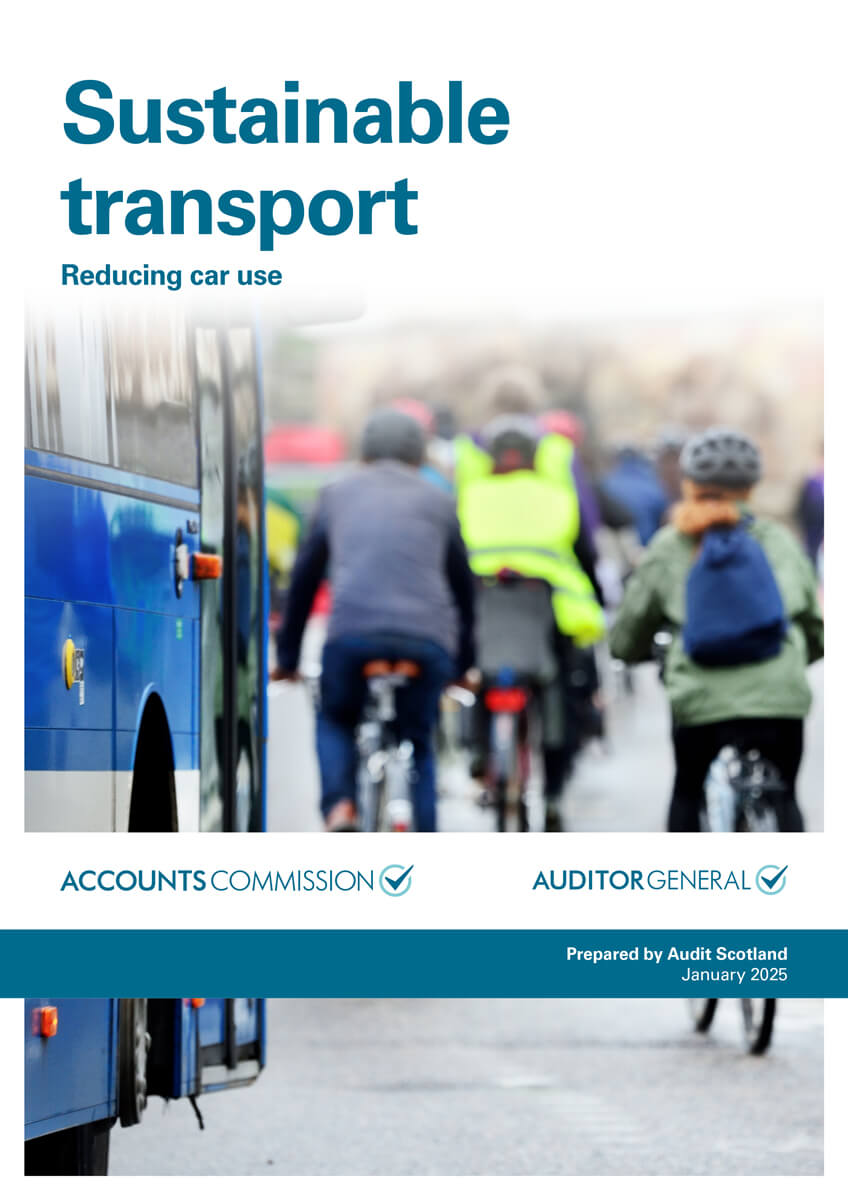
Sustainable transport audit engagement with the EHRAG
The audit scope considered feedback from the group which highlighted work such as the accessible travel framework, along with the need for equality impact assessments and the importance of consultation with specific individuals such as care workers and disability groups.
Lived experience and public participation
Our commitment:
- We will work in a participative and inclusive way, exploring new ways of capturing the citizen voice, empowering our staff and external organisations to work together to plan and deliver our equality outcome.
We established a community of interest group for lived experience and public participation who have supported developing guidance for colleagues. Once launched the guidance and community of interest will provide ongoing support to colleagues on engagement work.
We have piloted a human-rights based approach in a digital exclusion performance audit, which included establishing a lived experience reference group.
We set up a Youth Advisory Group which runs for two years from October 2023.
Case studies
Taking a human rights-based approach
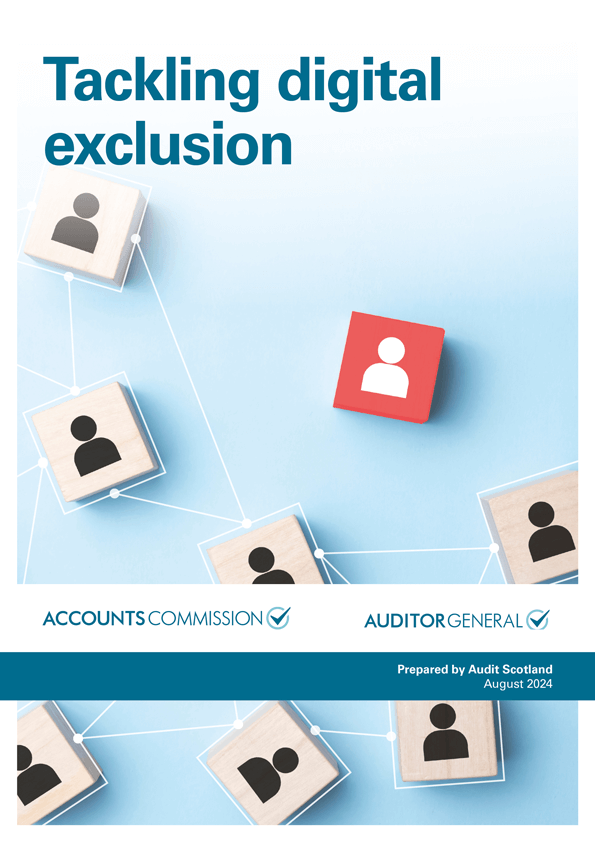
Participation
Accountability
Non-discrimination
Empowerment
Legality
Our Tackling digital exclusion audit used the PANEL principles to take a human-rights based approach to our audit work. This allowed people with experience of digital exclusion to participate in and inform the audit. People with lived experience formed a reference group, providing insight and feedback, helping to improve the accessibility of the findings. Various alternative outputs were used alongside the main report to ensure it was as accessible as possible. We will reflect and take learning to inform future work.
Youth Advisory Group
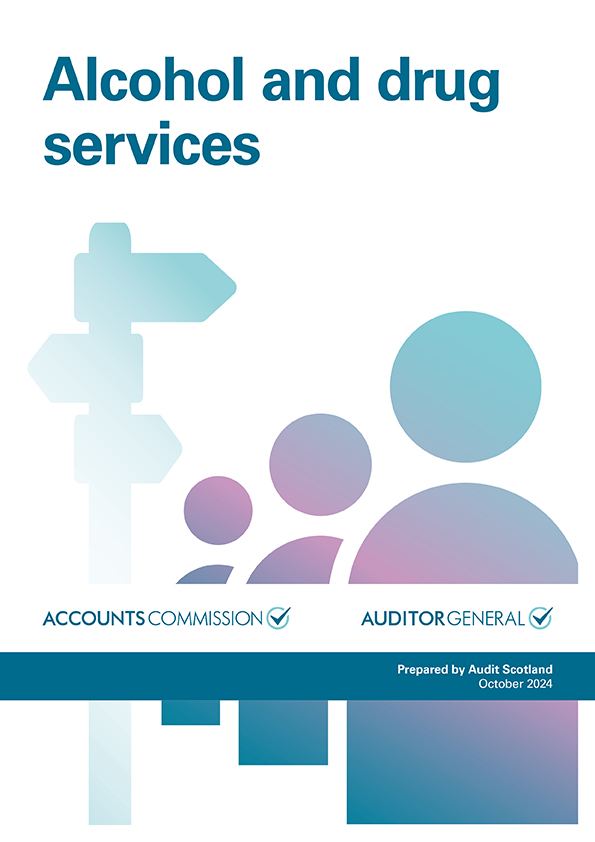
We are engaging with our Youth Advisory Group (YAG) on a wide range of audit work to help us think about how we consider the views of children and young peoples and how best to get our messages out to them. For our Alcohol and Drug Services audit the team worked with the YAG from early scoping through to post-publication.
The audit team used feedback from the young people to help inform some fieldwork questions, with evidence gathered leading to recommendations. The young people also produced a youth-led promo video about their contribution to the audit.
Outcome 2
We will increase the diversity of people into Audit Scotland and their progression through every level of our organisation.
- Outcome 1: Our work supports the public sector to address inequalities including protected characteristics and socio-economic disadvantage, and to protect human rights.
- Outcome 2: We will increase the diversity of people into Audit Scotland.
- Outcome 3: We will broaden our culture of diversity and inclusion.
Our people strategy 2023-28
We launched our first people strategy in November 2023 with diversity, equality and inclusion (DEI) as a key pillar. We believe that a diverse workforce is more productive and innovative and will enrich our service delivery. Our equality outcomes 2021-25 were the key driver for this element of our people strategy.
Recruitment and selection
We committed to:
- advancing our recruitment, attraction and selection strategies by enhancing our approach to data collection and reviewing data to deepen our understanding of the challenges, opportunities and needs of different groups
- taking positive action to increase interest from minority and underrepresented groups.
We have worked with brand ambassadors in universities across the UK to encourage more applications from underrepresented groups.
We have application mentorship so that applicants belonging to an under-represented or marginalised group can proceed with confidence that Audit Scotland encourages visibility, diversity and inclusion across the organisation.
We have seen an increase in applicant numbers from those disclosing they are from an ethnic background, from 25% in 2022/23 to 43% in 2023/24. 13% of all offers made in 2023/24 made were to those from ethnic minorities, an increase from 7% of all offers made in 2022/23.
Candidates who identified as Lesbian, Gay, Bisexual or Other (LGBO) made up 10% of the applicant population in 2023/24. This is a positive increase from 2022/23 where 8% of the applicant population identified as LGBO.
Employee information
The foundation of our work to deliver on our outcomes has been a focus on improving our employee information – ensuring an accurate record, analysing it and using the insight to inform our future work in this area.
We have:
- conducted research on how to improve our data collation to widen our understanding of the needs of our workforce. We worked with an external equality partner to get advice and benchmarking information to examine our progress
- worked with our employee network groups to encourage colleagues to update their sensitive information in our HR self-service system
- added a new category for capturing absences related to menopause symptoms and launched new data collection for carer and socio-economic status. We will start reporting on this in our annual diversity report for 2024/25.
Career pathways
We committed to:
- helping to raise awareness of career pathways and explore opportunities to widen their scope
- strengthening support for the progression of under-represented groups into more senior roles.
We developed a new opportunities board to advertise internal, short-term development opportunities openly and transparently. This supports all colleagues to broaden their skills, experience and knowledge.
We broadened our modern apprenticeship programmes with a wider apprenticeship programme for those joining our business support services team. Colleagues will now gain experience in a variety of corporate services teams during their training. We have also taken on new apprentices in our Accounts Commission Support and data analytics teams.
We launched a reverse mentoring scheme for our colleagues in trainee and entry level roles to mentor a member of Executive Team.
37 permanent promotions made in 2023/24
43% men
57% women
Of those staff who were promoted and disclosed their ethnicity
92% white
8% minority ethnic group (higher than representation within the overall Scottish working population)
We promote opportunities for flexible working at Audit Scotland to ensure staff can manage their own pursuits and personal lives around their work commitments. Our hybrid working policy promotes flexibility with no mandated number of in office days expected.
Our people
Source: Audit Scotland's Annual diversity report 2023/24.

| Our People Age | Audit Scotland 2020/21 | Audit Scotland 2023/24 | Scottish working age population |
|---|---|---|---|
| 16 to 24 | 5.0% | 7.2% | 16.8% |
| 25 to 34 | 26.0% | 27.2% | 20.1% |
| 35 to 49 | 39.0% | 36.5% | 29.3% |
| 50 to 64 | 29.0% | 29.0% | 33.8% |
| 65+ | 1.0% | 0.1% |
We recognise that young people aged 16-24 are underrepresented in our workforce compared to the national working age population. However, we also know that an aging population and flexible retirement opportunities mean that we may never match the national working age population figures. We have made good progress over the past two years on expanding career pathways in Audit Scotland and we will continue to focus on widening access to careers at Audit Scotland as part of our new DEI strategy.
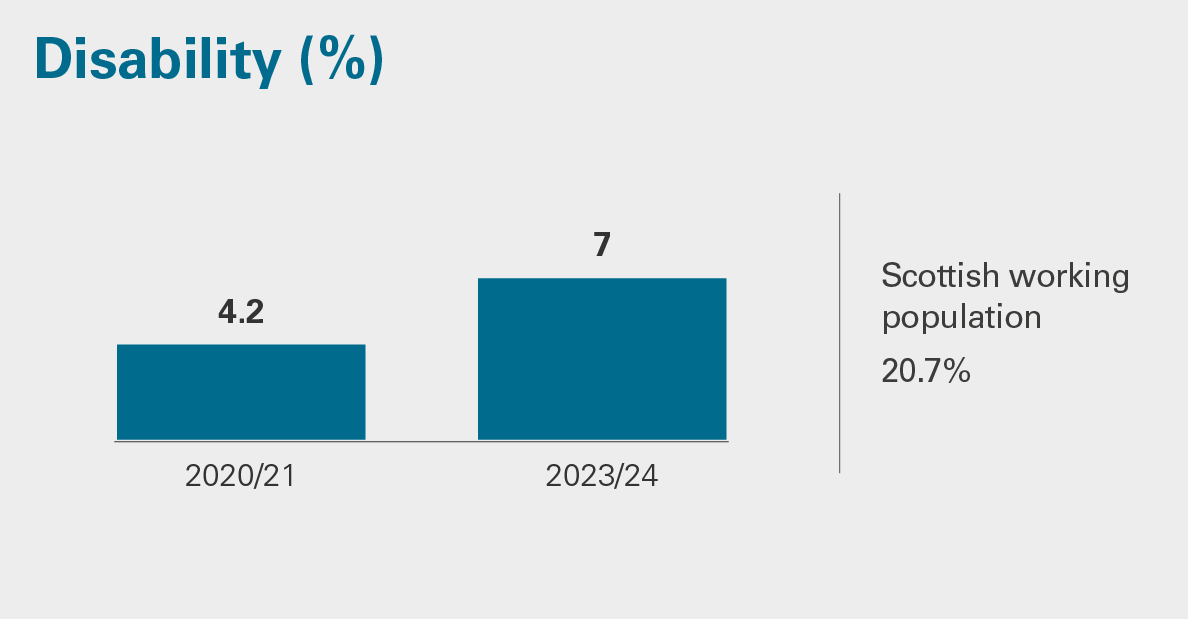
| Audit Scotland employees 2020/21 | Audit Scotland employees 2023/24 | Scottish working age population |
|---|---|---|
| 4.2% | 7% | 20.7% |
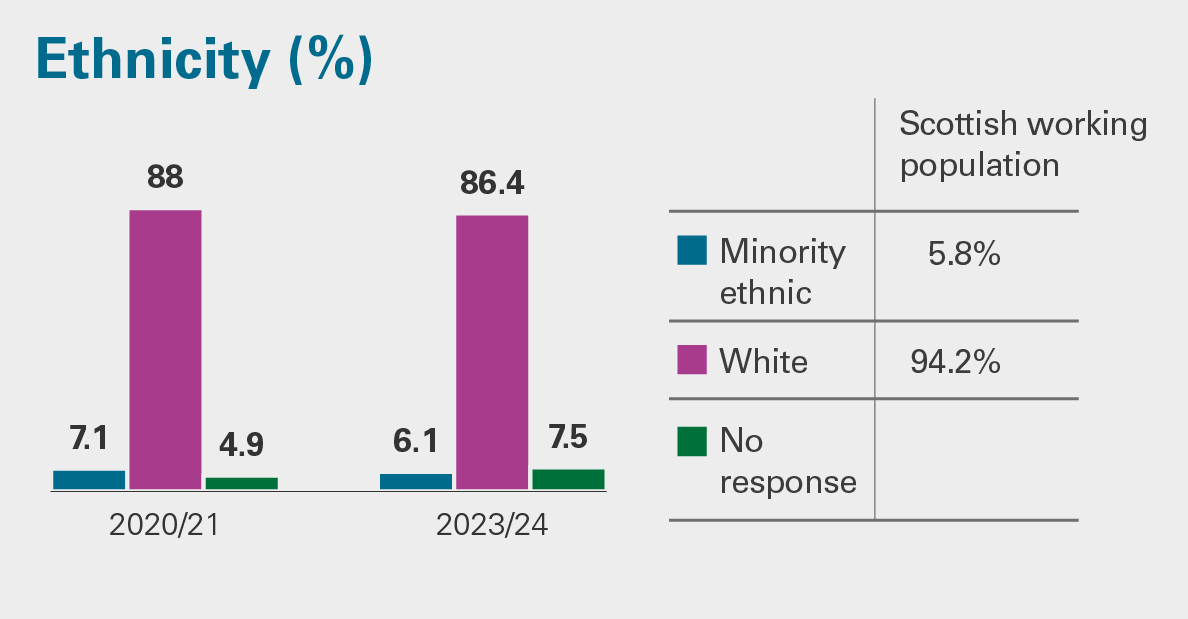
| Ethnicity | Audit Scotland employees 2020/21 | Audit Scotland employees 2023/24 | Scottish working age population |
|---|---|---|---|
| Minority ethnic | 7.1% | 6.1% | 5.8% |
| White | 88% | 86.4% | 94.2% |
| No response | 4.9% | 7.5% |
Our colleague disclosure rates for disability are low, which makes it difficult to compare the number of disabled people working at Audit Scotland to the Scottish working population. As part of our new DEI strategy, we have identified an outcome to increase awareness about disabilities and support disabled people to secure employment and progress their careers within Audit Scotland.

| Religion or belief | Audit Scotland employees 2020/21 | Audit Scotland employees 2023/24 | Scottish working age population |
|---|---|---|---|
| No religion | 46% | 47.8% | 51.1% |
| Church of Scotland | 15.2% | 12.2% | 20.4% |
| Roman Catholic | 10.7% | 13.8% | 13.3% |
| Muslim | 3.6% | 2.9% | 2.2% |
| Another religion | 5.1% | 9.3% | 9.06% |
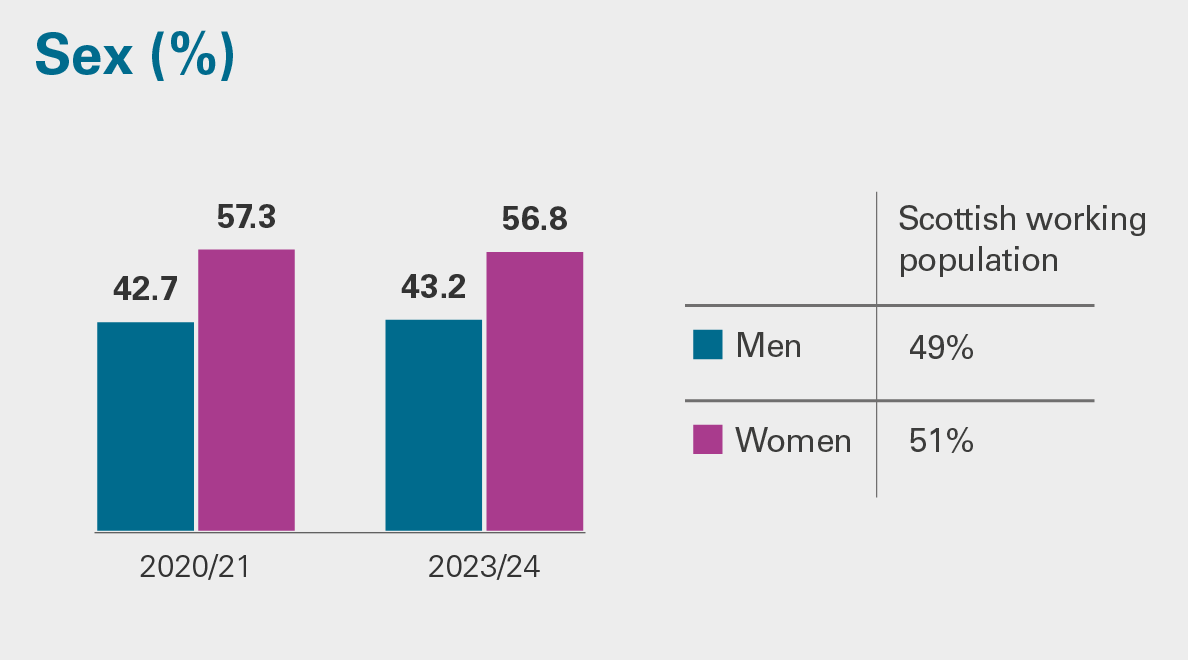
| Sex | Audit Scotland employees 2020/21 | Audit Scotland employees 2023/24 | Scottish working age population |
|---|---|---|---|
| Men | 42.7% | 43.2% | 49% |
| Women | 57.3% | 56.8% | 51% |
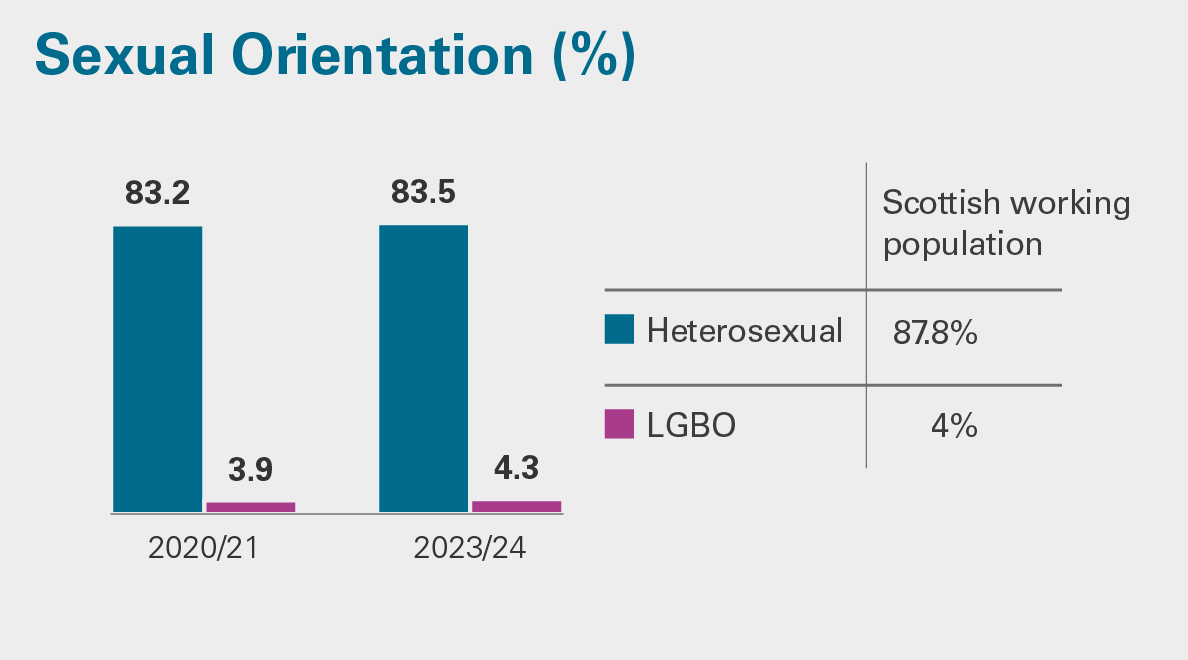
| Sexual orientation | Audit Scotland employees 2020/21 | Audit Scotland employees 2023/24 | Scottish working age population |
|---|---|---|---|
| Hetreosexual | 83.2% | 3.9% | 87.8% |
| LGBO | 83.5% | 4.3% | 4% |
Outcome 3
We will broaden our culture of diversity and inclusion, so all employees feel valued, engaged and contribute.
- Outcome 1: Our work supports the public sector to address inequalities including protected characteristics and socio-economic disadvantage, and to protect human rights.
- Outcome 2: We will increase the diversity of people into Audit Scotland.
- Outcome 3: We will broaden our culture of diversity and inclusion.
Our values
As part of developing our new corporate plan 2023-2028 we agreed new organisational values. Our equality value sets out that we will:
- treat all people fairly and support them to have the best chance to progress and succeed
- broaden our culture of diversity and inclusion, so people are valued and engaged
- apply our standards of quality and professionalism to all our work
- embed equality in all we do and support public bodies to address inequalities.
During 2023/24, we focused on what our values mean in practice. Our Leadership Group delivered workshops for colleagues to discuss how our values translate to attitudes and behaviours, considering what they look like when we are doing them well and when we aren’t getting it right.
More than 240 colleagues participated in these workshops, nearly 70 per cent of our workforce. From this we have developed and agreed a values charter to support us to further embed the values into our everyday work. We have refreshed our approach to employee performance appraisal and development to embed our values into approaches to objective-setting, development planning, feedback and recognition.
Staff diversity network groups
We committed to:
- analysing feedback from our employees and listening to members of our diversity groups to strengthen and deepen our understanding of the challenges, opportunities and needs of the different groups of people that make up our workforce
- using this information to strengthen the minority networks across Audit Scotland.
Audit Scotland colleagues have increased and strengthened our network of employee diversity groups, representing a range of protected characteristics. We have six groups with over 80 members (about a quarter of our workforce):

Carers support group

Disability Confident Working Group

LGBTQ+ Group

Managing Menopause Group

Race, Ethnicity and Cultural Heritage Group (REACH)

Neurodiversity Group
The groups regularly deliver sessions to new colleagues as part of our induction programme to promote their work and explain the impact and benefits of being a member. During 2023/24 there were 92 attendances at these sessions and during 2024/25 there were 147 attendances.
We regularly consult with network groups on equality impact assessments, informing internal policy development and procurement of new suppliers.
We have developed a terms of reference template to support network groups to have a clear purpose, objectives and priorities. The groups are invited to attend our new Equality and Human Right Strategic Group to raise awareness of their plans and seek support where required for their activities.
Key highlights from our network groups during 2023/24 and 2024/25 include:
- Carers Support Group – Grew membership and developed a proposal to provide five days of paid leave for all carers, above the statutory requirement for carers leave, which was approved by our Executive Team.
- Disability Confident Working Group – Consulted with disabled staff and shared views on recording a disability, recruitment and progression, management support and adjustments and hybrid working to inform policy and planning. Supported the development of our employee passport approach.
- LGBTQ+ – Grew membership and delivered a bake sale to raise awareness of the group and to raise money for LGBT Youth Scotland.
- Managing Menopause – Consulted with staff on the work of the group and interest in manager training sessions. Published a menopause policy and achieved the Menopause Friendly Accreditation. This independently assessed award recognises the hard work, high standards and proven practices that we have put in place to embrace menopause in the workplace.
- REACH – Consulted with staff and found we can do more on communication and specific training, especially for line managers, on microaggressions, allyship and unconscious bias. Our communications team worked closely with the group to produce a statement of support which was issued to all colleagues during 2024/25. This recognised the impact that world news events such as the race riots in the UK and the War in Gaza can have on the wellbeing of many colleagues, but particularly on those from minority communities.
- Neurodiversity Group – Rolled out neurodiversity awareness training across the organisation and supported the development of our employee passport approach. Participated in our “Empowering every voice: The path to diversity, equality and inclusion in the workplace” keynote.
Learning and development
We committed to providing training and development to employees across the organisation, strengthening understanding of the experiences and challenges faced by minority groups and improving their working experience.
We provided:
- mandatory and optional DEI e-learning opportunities. Mandatory training included inclusion essentials and sexual harassment for all colleagues and managing diversity for managers. Optional training included new content on unconscious bias, allyship, microaggressions in the workplace and menopause at work. In 2023/24 there were 218 DEI e-learning completions, and this increased to 676 completions in 2024/25. The increase was mainly due to the mandatory sexual harassment training for all colleagues.
- instructor-led learning events with a DEI focus, including inclusive leadership, neurodiversity awareness, making reasonable adjustments, bystander intervention and allyship. During 2023/24 there were 105 attendances at DEI instructor-led training, and this increased to 235 attendances in 2024/25. The increase was mainly due to rolling out neurodiversity awareness training.
Looking ahead
While this report shows significant progress against our outcomes over the past two years, we recognise we have more to do in the following areas:
- Equalities and human rights in the annual audit – Developing clear guidance for appointed auditors to maximise the time they spend on equality and fairness during the appointment round and improving our monitoring of this coverage to identify good practice and learning to inform future planning.
- Employee information – Encouraging more colleagues to disclose information about their protected characteristics to help inform our planning and understanding our progress with diversity, equality and inclusion initiatives.
- Employee network groups – Building our culture of inclusion by promoting our staff diversity network groups and supporting them to increase their membership, and ensuring they are empowered to deliver awareness raising activities and to support people who share protected characteristics.
- Our new diversity, equality and inclusion strategy sets out our new equality outcomes for 2025 to 2029 as well as our planned work around mainstreaming equality and human rights, improving employee information and impact assessment. We will take forward these areas for improvement through our new strategy.

Public audit plays a vital role in tackling inequalities Scotland. We continue to focus on public bodies in Scotland working better together to target spending and deliver better outcomes for people in Scotland.
Stephen Boyle Auditor General for Scotland
Reducing inequalities and improving the lives of people and communities is central to our local and national reporting across local government.
Jo Armstrong Chair of the Accounts Commission
Audit Scotland is committed to diversity, equality and inclusion because it is simply the right thing to do, and it brings significant benefits to our people, our organisation and Scotland's communities.
Colin Crosby Chair of Audit Scotland Board
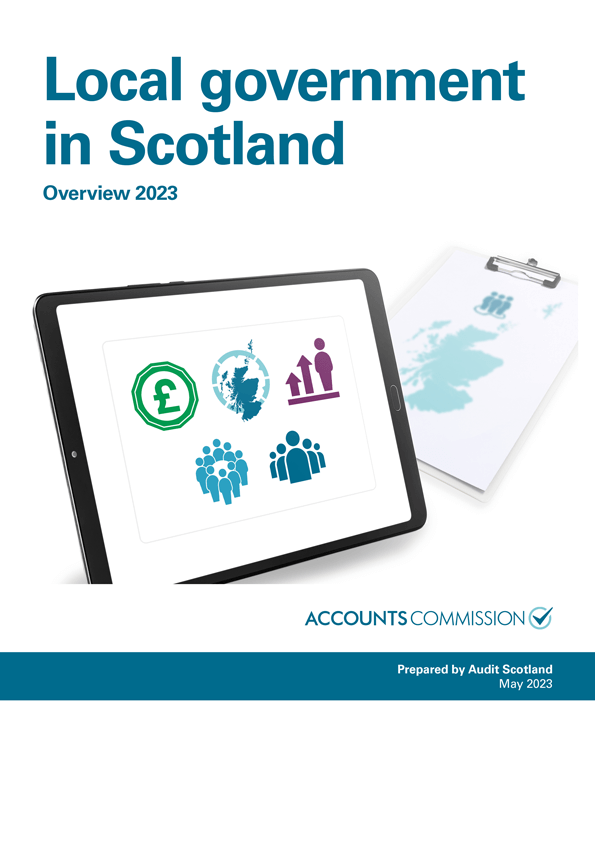 Local government in Scotland: Overview 2023
Local government in Scotland: Overview 2023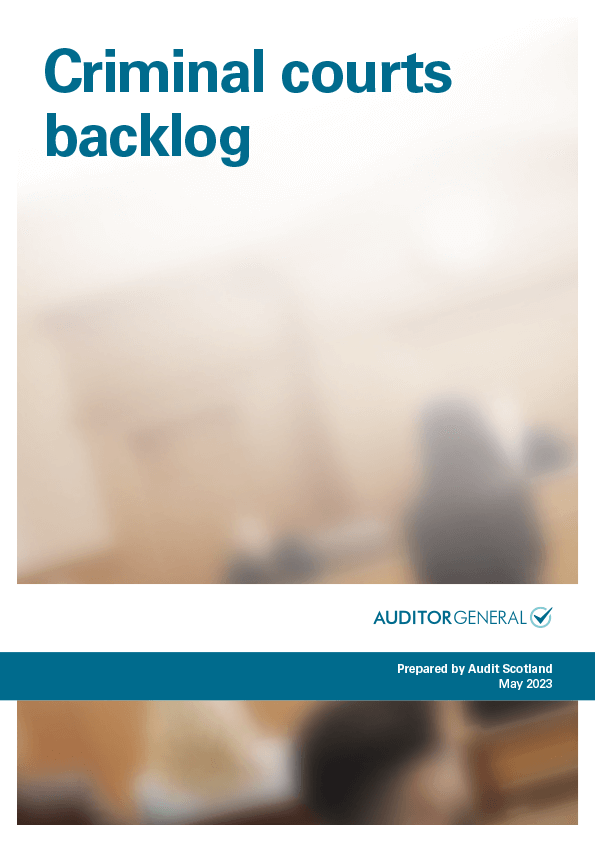 Criminal courts backlog
Criminal courts backlog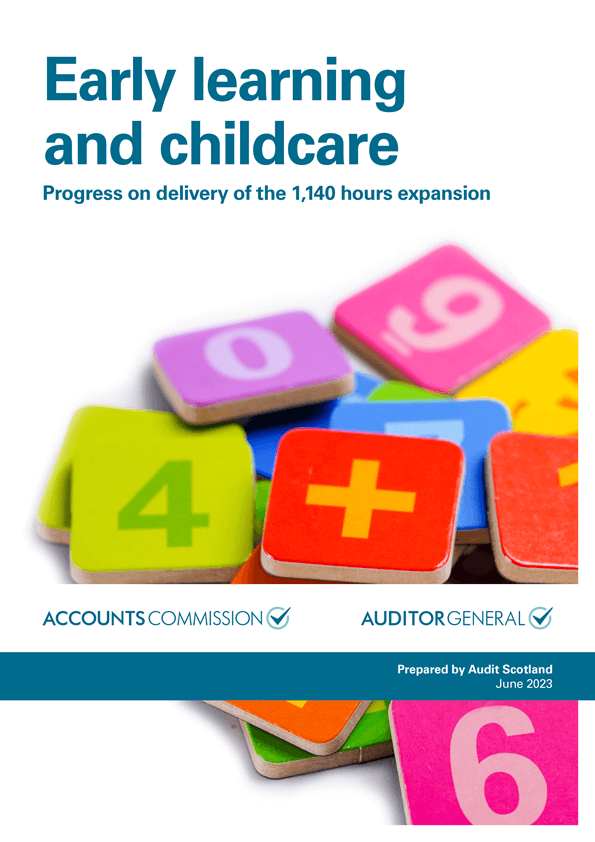 Early learning and childcare: Progress on delivery of the 1,140 hours expansion
Early learning and childcare: Progress on delivery of the 1,140 hours expansion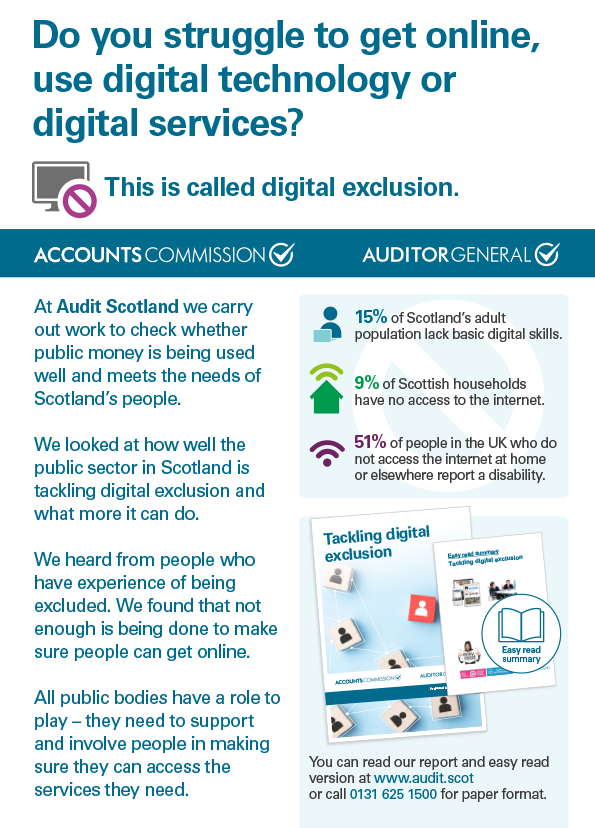 Printable flyer
Printable flyer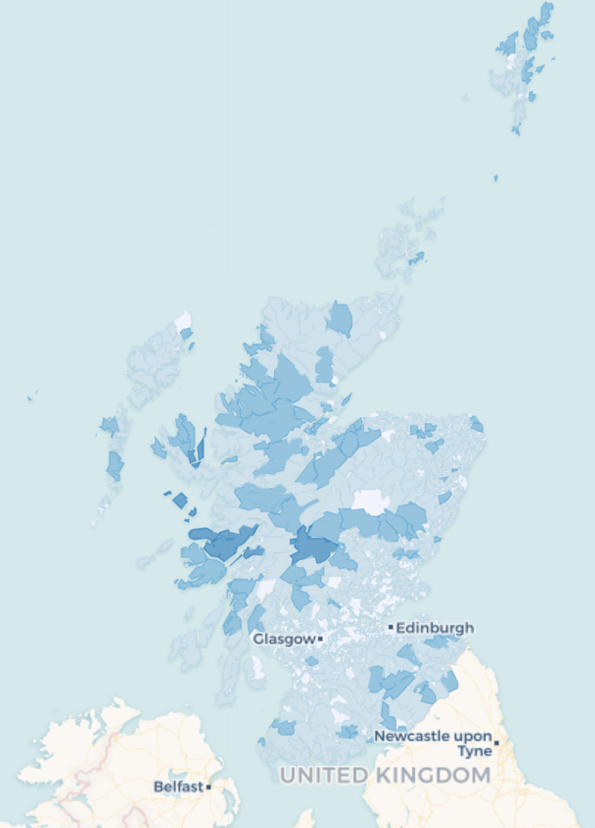 Interactive exhibits
Interactive exhibits






